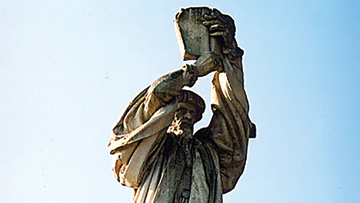You have free articles remaining this month.
Subscribe to the RP Witness for full access to new articles and the complete archives.
William Farel was the spark plug of the Reformation in French-speaking Switzerland. He placed his faith in Christ while studying the letters of the Apostle Paul under pro-reform scholar Jacques Lefevre in Paris. Lefevre never left the Roman Catholic Church but sought reform from within.
Lefevre’s pupil, William Farel, continued to welcome Reformation ideas from Luther in Germany. Farel began as a professor at the university and then became a preacher in Paris by 1522. Even in the early days of the Reformation, Farel drew scholars and preachers together effectively to advance the cause of the Reformation. He was a high-energy evangelist, a recruiter, an organizer, and a debater.
A fiery preacher who held the attention of crowds with his gifts, Farel was forced to flee from Paris in 1523 because of his ardent opposition to the Roman Catholic Church. He fled to Switzerland, where his deep devotion, personal piety, and superior debating skills helped him to win Swiss cities like Bern, Basel, Lausanne, and Neuchâtel to the side of the Reformers. He also struck out through the Alps to recruit some of the Waldensians to Reformed thinking. Through his influence, they printed the first French translation of the Scriptures in 1535.
Farel spoke more than he wrote. However, he did publish basic discipleship material to show how Reformed theology was to be lived out in daily life. Further, he connected writers and publishers to help fan the flame of the Reformation through the printed word.
In the cities where he worked, the fearless Farel inspired and trained a number of young preachers whom he sent out into the harvest fields.
In 1532, William Farel was in Geneva, Switzerland, for a short time. The Council of Two Hundred (the upper legislature of Geneva) had ordered the pure gospel to be preached, but the political winds soon changed and the bishop had Farel evicted. He was able to return a year later. By 1535, Roman Catholicism had been heavily suppressed in the city, but the surrounding mountains were filled with sympathizers of the pope who were allies with the Roman Catholic Duke of Savoy. Farel knew that the decadent city of Geneva would need vigorous discipleship if it were to resist being overtaken by Catholicism and go on to become the gospel training hub he envisioned it might be.
In 1536, William Farel made his most important contribution to the Reformation. He and John Calvin had run in some of the same circles in Paris, so Farel was familiar with Calvin. He also knew that Calvin had just completed what would be his magnum opus, The Institutes of the Christian Religion. When Farel heard that the 27-year-old Calvin had stopped to spend the night in Geneva, he immediately went to Calvin’s quarters to beg him to stay to help reform the city. Calvin refused, because he wanted a quiet life of study that a city like Strasbourg could afford. Farel became impatient, sensing that Calvin was placing his own desires for peace above the needs of Jesus’ Church. As the argument wore on, Farel rose, stared down John Calvin, and declared, “May God curse your studies if now, in her time of need, you refuse to lend your aid to his church.” Calvin listened to God’s servant, changing the course of history.
Farel and Calvin worked together for two years before they were banished from Geneva in 1538. William Farel went to Neuchâtel, where he spent the remaining 27 years of his ministry, but through Farel’s influence in 1541, Calvin returned to Geneva.
Under Calvin’s tutelage, Geneva became “the most perfect school of Christ that ever was on the earth since the days of the apostles,” in the words of John Knox. Hundreds of preachers were sent out from Geneva and across Europe in the decades that followed.
William Farel may be commended for piety, zeal, boldness, and tenacity, but he must also be remembered for his humility. He recognized when he was incapable of meeting the need of the hour, and he recruited others who were more skilled than he. He was willing to decrease as others increased. The result is that the name of William Farel is forgotten by most people, but the name of Jesus Christ has become more gloriously known thousands of times over across the globe.
James Faris | Second (Indianapolis, Ind.) RPC
